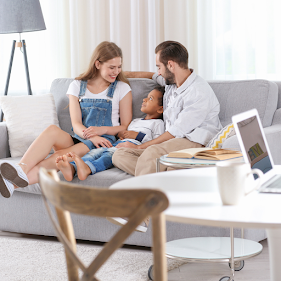The Art of Balancing Act: Getting Back into Routine with Life, Work, and Kids in School
Mastering the art of balancing life, work, and kids when getting back into routine with work and school.
As parents, we must manage multiple responsibilities simultaneously, including work, family, and personal life. As the new school year begins, finding a balance between these tasks can be challenging. However, with careful planning, effective time management, and a positive attitude, getting back into a routine can be smooth and rewarding.
In this blog post, I will explore practical strategies to help you navigate this transition and create a harmonious routine supporting your family and professional life.
1. Embrace the Power of Planning
To manage your various commitments effectively, create a master schedule incorporating all aspects of your life, such as work, school, extracurricular activities, family time, and personal obligations. Dedicate time to planning and preparing in advance, whether weekly meal planning, organizing school supplies, or mapping out your work projects. By having a clear roadmap, you can reduce stress and ensure that everyone's needs are met.
To manage your various commitments effectively, create a master schedule incorporating all aspects of your life, such as work, school, extracurricular activities, family time, and personal obligations. Dedicate time to planning and preparing in advance, whether weekly meal planning, organizing school supplies, or mapping out your work projects. By having a clear roadmap, you can reduce stress and ensure that everyone's needs are met.
One thing that my family and I find essential is having a calendar on our fridge. This allows my husband and me to sit down together, discuss all the daily events, and make sure to note them down on the calendar. This way, we both have a clear idea of what lies ahead and can plan accordingly. This calendar has become integral to our family planning routine, making everything more manageable and stress-free.
We use an easy-to-use calendar purchased from Amazon Canada that we put on the fridge. It doesn't have to be fancy; find what works best for you. This one works perfectly fine for us. I also like to keep the past months that we wrote on so that by the end of the year, we can go over all the events and projects we completed. It's an excellent way to reflect on what we have accomplished throughout the year, and it also comes in handy when you need to go back to specific dates for certain events.
2. Establish Consistent Routines
Routines provide a sense of stability and security for both children and adults. Set consistent wake-up and bedtime routines to ensure everyone gets enough rest. Create a morning routine that includes time for breakfast, getting dressed, and preparing for the day ahead. Similarly, establish an evening routine for winding down, quality family time, and sufficient rest. Consistency in routines helps children feel grounded and allows parents to manage their time effectively.
In my family, we believe in managing our time efficiently. We have set specific rules for screen time, which helps us prioritize essential things such as completing homework, spending quality family time together, and following the three B's routine - Bath, Book, and Bed. Our three B's routine begins at 7 PM so that by 8 PM, the kids are asleep and well-rested for the next day. Following this routine has always worked wonders for us. Establishing a new routine takes a little effort and consistency, but it's worth it. Keep going even if the routine doesn't work out as planned. Try again the next day and keep trying until it becomes a habit. Usually, after three to five days, the routine kicks in and becomes a part of your daily life. I would love to know if you have a similar routine and how it works. Please feel free to share your thoughts in the comments below.
3. Foster Open Communication
No matter your children's age, it's never too early to establish open communication channels with them. You can start by asking them about their day, what they did, and if they enjoyed themselves. Listen to what they have to say and respond appropriately. This helps build a foundation of trust and comfort that will be essential as they grow older and face more complex challenges. You can also create a safe and supportive environment by praising their efforts and accomplishments and being patient and understanding when they make mistakes. As they age and start attending school, you can continue checking in with them about their schoolwork, activities, and any challenges they may face. By maintaining open lines of communication, you can help them feel valued, supported, and connected, which is essential for their healthy development.
As soon as my children return from school, we make it a point to review their day. Our designated study area has an easel, desk, chairs, arts and crafts, books, pencil cases, and other fun tools commonly used in a classroom. Not only does this encourage their creativity and help them express themselves better, but it also allows them to talk about their day in a fun way. You'd be surprised how being creative in storytelling about their day at school can help! Give it a try and see for yourself. It's a great way to keep communication channels open so you can address any challenges they might have had and help them overcome them without feeling overwhelmed.
4. Practice Self-Care
As the new year begins, it is essential to remember to take care of ourselves amidst the hustle and bustle of everyday life. Maintaining a healthy and balanced routine is critical for our well-being. It is crucial to prioritize self-care activities that recharge and rejuvenate us, such as exercising, pursuing hobbies, or spending time with friends. We should set aside some time each day for relaxation and self-reflection.
No matter what, we always continue our wellness routine consistently. For me, it involves daily walking and yoga, while my husband prefers sports activities. We have dedicated days for ourselves and never let our routine go. Scheduling our wellness activities in the calendar on the fridge also helps us stay on track and serves as a fresh reminder to keep at it! Remember that when we care for ourselves, we can better care for our family and excel professionally.
5. Flexibility and Adaptability
Teaching kids the importance of adaptability can be challenging, but starting in childhood is essential. You can create a flexible routine for your children, incorporating spontaneous activities or events. For example, you can plan an impromptu dinner outing or a surprise trip to the ice cream shop. This will help your children learn to be open to new experiences and adjust their plans accordingly.
Encouraging children to be adaptable is a beautiful way to help them navigate life's unexpected challenges. By involving them in problem-solving activities and inspiring them to think creatively, we can help our children develop the skills they need to thrive. One way we do this is by asking them to find a creative way to fix a broken toy or devise an alternative activity when it's raining outside. Every challenge can be an opportunity to express creativity and foster adaptability. It always turns out to be a fun way of creative expression with an adaptable outcome.
Lastly, it's essential to model adaptability yourself. Children learn by example, so they will likely follow your lead if you are flexible and open to change. When something unexpected happens, take a deep breath, stay positive, and show your children how to solve problems calmly and constructively.
In conclusion, achieving balance amidst the busyness of life, work, and children's school can seem challenging, especially after the holidays; there are ways to achieve balance by utilizing the power of planning, establishing consistent routines, practicing effective time management, fostering open communication, prioritizing self-care, and being flexible. Creating a harmonious routine supporting your family and professional life can be accomplished through these strategies. It's important to remember that it's not necessary to achieve a perfect balance every day but rather to find harmony in the flow of daily life. Embrace the journey and enjoy the rewards of a well-balanced and fulfilling life with your loved ones.
Disclaimer: Please note that I do not get any affiliate commissions from Amazon for the links provided in this blog.



Comments
Post a Comment